June 6th, 2012 the East Liverpool Historical Society (the other ELHS) conducted a phone interview with Monica Hoschar-Baugh, Class of 81 and ELHS Athletic HOF Member.
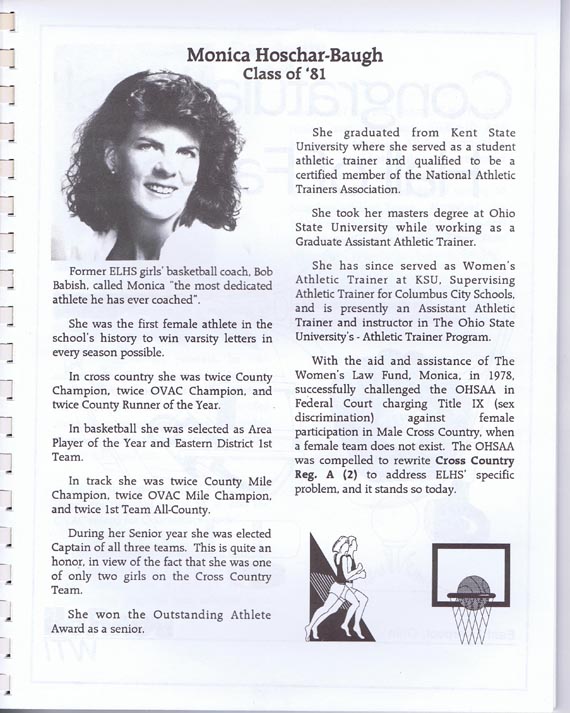
A LITTLE BACKGROUND
Refer to"
The Evolution of Female Inter-Scholastic Athletics at ELHS
The "Monica Rule" as it reads currently:
OHSAA BYLAWS (2011)
Revised by Referendum — May 2011
Section 6. Team Membership
1-6-1 Girls may play on a boys team if there is no girls team or if the overall opportunities for interscholastic competition are less for girls.
1-6-2 A girl that is a member of a boys team shall follow all contests rules and regulations regarding the sport as specified for the boys.
1-6-3 Boys may not play on girls teams unless the overall opportunities for interscholastic competition for boys are less than for girls and the competing schools mutually agree.
THE INTERVIEW
ELHS: You were involved not only in sports in high school, but in changing rules and making some history so to speak.
Monica: Yeah. I look back on it now and it was definitely something, I don't know, monumental is not the word I want to use, that's too big, but at the time, I don't even know if anybody knew what was going on. I don't think even some of my teammates that I ran with even realized what was going on. It was not that big of a deal [to us] if that makes sense.
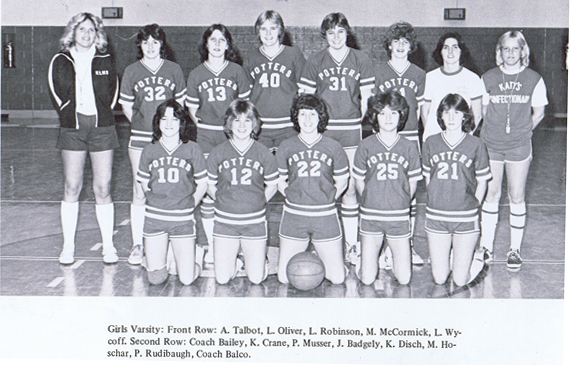
From the 1979 Keramos Yearbook.
ELHS: Yes, sometimes some time has to pass before people realize what something really meant.
Monica: Yes, exactly.
ELHS: You participated in three sports?
Monica: Yes, three.
ELHS: For the four years you were in high school how many letters did you earn?
Monica: This was a time when high school started with 10th grade.
ELHS: You graduated in 1981?
Monica: Yes, and high school sports started with 10th grade. When I played, ninth-grade was at Westgate and we couldn't play with the high school. When I started high school. I lettered in three sports every year, nine letters.
ELHS: It was pointed out to me a while back that major colleges won't take high school players who have had leg injuries.
Monica: That's not really true.
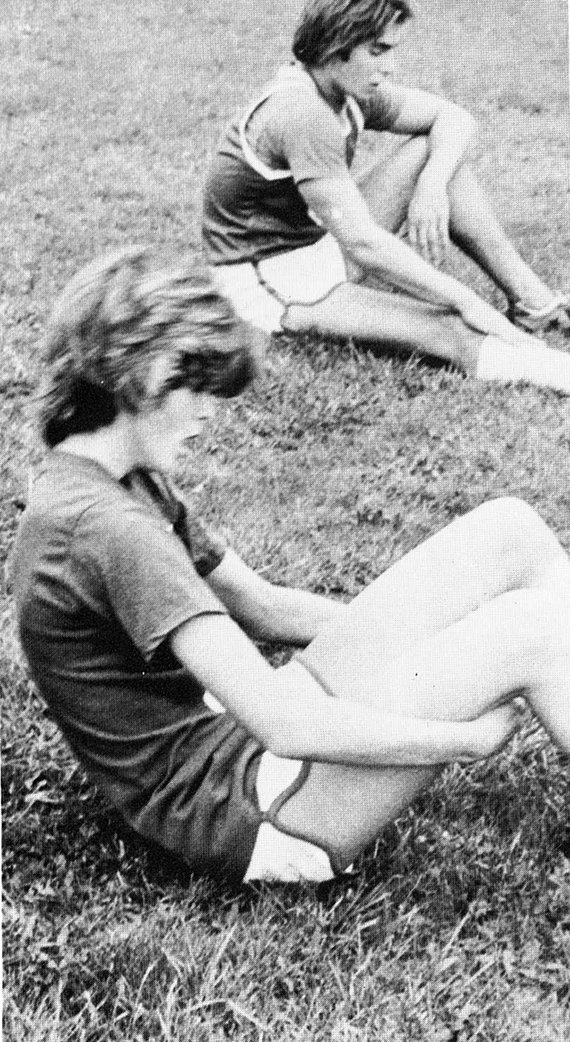
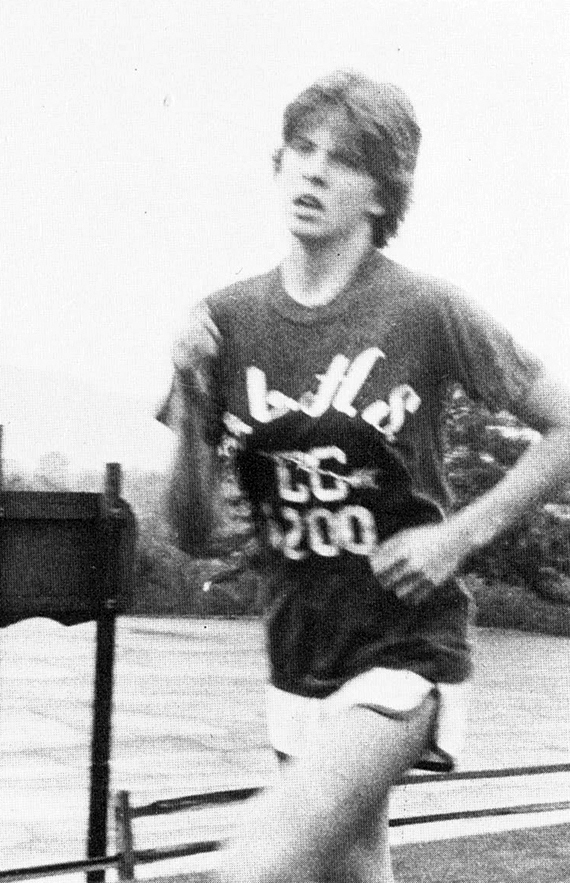
Above two pictures were from the 1980 Yearbook. Monica Hoschar has one goal in mind every time she puts on her cross country uniform; to do the best she can at that particular moment. With that goal In mind, Monica became the "woman to beat" in Columbiana county.
Monica is a unique person. She does not enjoy dot of people's praises and as a matter of fact, she becomes embarrased when people acclaim her achievments.
Monica started running just for something to do. She loves the sport and the sport loves her. This year Monica was the individual champion of Columbiana county. She also achieved many more awards.
Monica Hoschar, Remember that name.
ELHS: It's not?
Monica: No, it depends. You can come back from a lot of injuries. If they see the talent and if they see everything else there, they usually don't shy away from somebody who has had an injury. Now, a major, major injury, if they have had three or four injuries and something that is a little more congenital, and if the condition is congenital or not, and in that situation they would know if it were congenital or not. That would be a different story.
Monica: Believe me, most of the kids now who come in have had injuries of some kind because they are playing so much earlier in high school and in summer leagues and whatever else all the time.
Monica: It's not necessarily a doom and gloom thing. I was an athletic trainer and we would look at records of kids all the time and we actually complained, "Why would you take him?" It's almost the opposite, the coaches almost pushing, like "yeah, he'll be fine" kind of thing. They didn't usually shy away from them too much. Unless there is a couple different things like speed, power, grades, a couple different things.
ELHS: We have had several different athletes that are going to Division III schools the last few years.
Monica: The good thing about Division III that people do not realize is that, and they kind of hide this just a little bit, . . .you do get offers because you're an athlete, so to speak, you do get offers a lot of the time. It's almost a full ride, but officially it's an academic scholarship. So you can go there and if for some reason you do not want to play the sport, you still have your money. If you quit, it doesn't matter, you still have your money. You can go for however long your offer or scholarship or whatever it is. Some kids get to school and realize, I really don't want to play this sport anymore, and they possibly knew that at Division III schools, you can quit and keep your scholarship which is good.
ELHS: And you can play more than one sport.
Monica: Yes, you can play more than one sport.
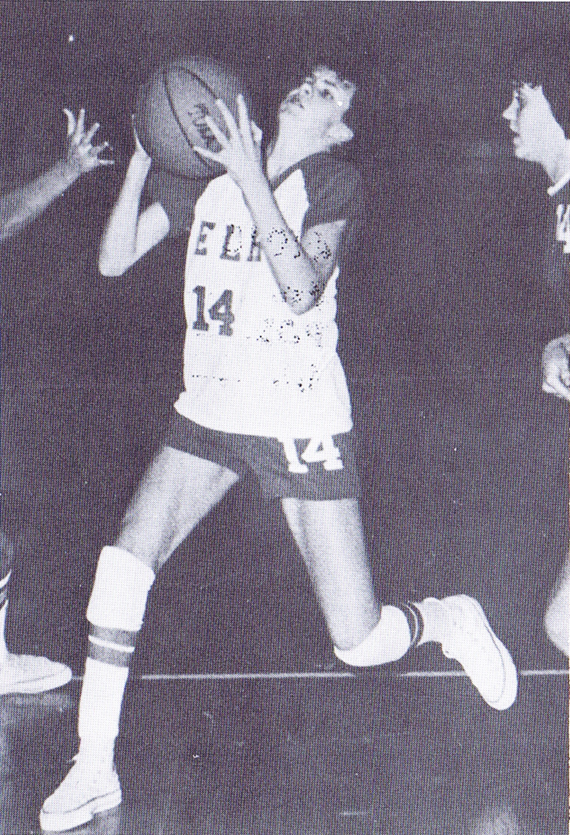
Picture from the 1980 Yearbook.Jr. Monica Hoschar sneaks past her opponents for twp points.. Hoschar scored a total of 53 points during the season.
ELHS: Back to your days in high school. The result of the legal action, it ultimately did allow you to run?
Monica: Yes, what happened was. I read on the website, the facts weren't completely right, fairly close but not completely right. What happened was that we had the whole fall training session and it was like the day before the meet that Mr. Price found out. Either he found out or he possibly knew or he inquired, either way, a day or two before the first meet, he said," Hey, you can't run officially with the boys, because that would disqualify you for the end of the year for any of the districts, regional or state. You wouldn't qualify for that.
Monica: I was like oh okay. We already had a plan. He said, we will just start you 30 seconds behind everybody else and pretend like oh, she was just here, just running on the course, 30 seconds behind everyone else. I said, oh, that's cool. So I didn't think anything of it. When I came home and told my dad he said, "No, that is "wrong". I said, well, that's the way it is.
Monica: We kept our plan, starting 30 seconds behind the boys. Actually, it was me and Donna who was the other teammate I had. [There were only two girls on the CC team.] We understood it was not fair, but I was ready, I was training.. It was kind of cool, starting 30 seconds behind them. Well, towards the end the race some of the boys, I start to pass them at the very end of the race. They would take off and sprint and try to beat me. They didn't want to get beaten by a girl, but they didn't seem to remember they started 30 paragraph seconds in front of me. I didn't rub it in, or say anything, but it was definitely something I was thinking about.
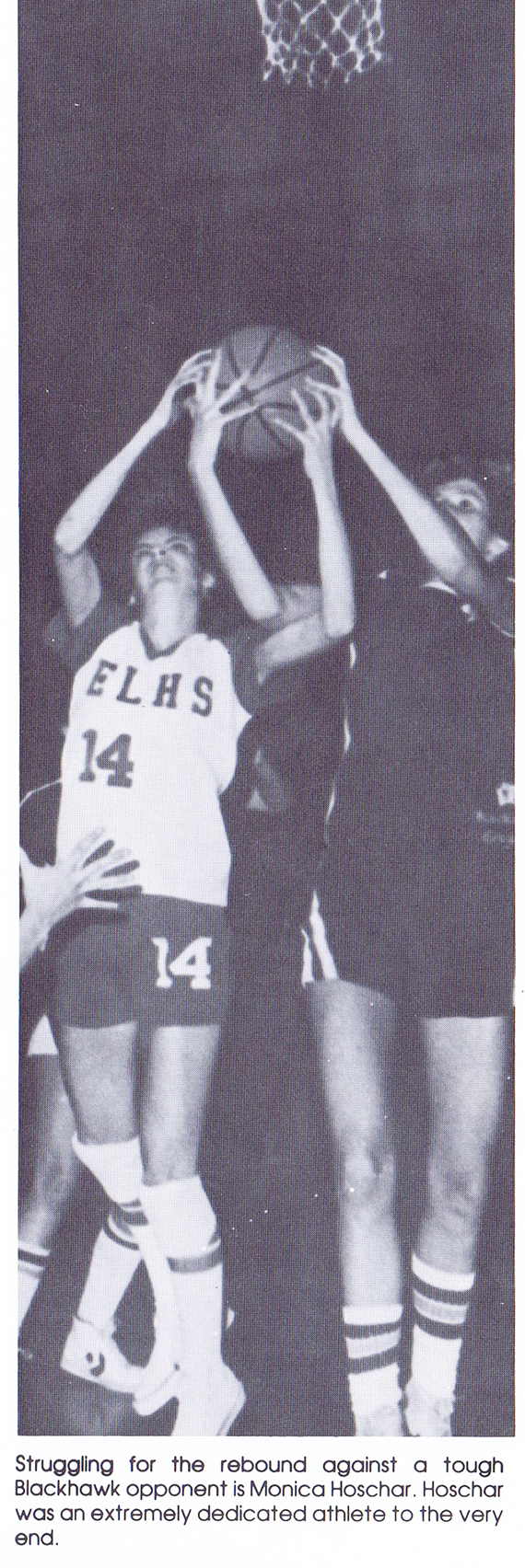
Also from the 1980 yearbook: Top scorers on the girls track team were Kim Augur, Monica Houschar and Peggy Rudibaugh
ELHS: So technically you're not officially in the race?
Monica: Technically, I was not officially in the race, correct. We started 30 seconds behind the guys. Until later when we won, until we get to the court and they heard it. It took a while. I want to say, at least half the season, until we were okay. I remember at least three or four meets before we could start with the boys.
ELHS: What would've happened if you had won one of those races?
Monica: Yeah, I know, that would have been funny. I wasn't good enough to win against any of the boys who actually won, but I definitely would have beat a lot more of the other boys if I didn't start 30 seconds behind them, that's for sure. It was kind of funny.
ELHS: You ran track?
Monica: Yes.
ELHS: and played basketball?
Monica: Correct.
ELHS: Which of the three did like best?
Monica: Probably basketball.
ELHS: It does take a little more skill, eye hand coordination, etc.
Monica: Yeah. I love basketball. It's not that I didn't like running. Obviously running is harder and I liked the team aspect. You have a team on cross-country and you have a team on track, but really it's not. What they do and what you do really doesn't usually interact with each other. So I think I really liked team aspect more of basketball.
ELHS: What got you into sports in the first place?
Monica: Probably my cousins that lived right across the street, the Sullivans' and my second oldest brother Rick. He always played with them. So I played with them too. They had six boys.
ELHS: So that's basically how you developed your skills.
Monica: Yes.
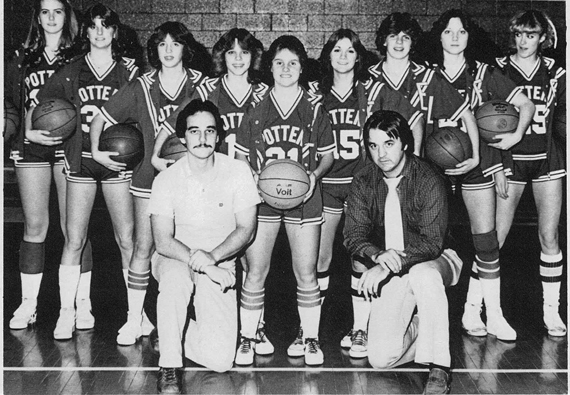
The 1980-81 Varsity girls basketball squad (left to right): Pam Toot, Melisa Kinsey, Beth Franz, Lynne Wilson, Robin Henderson, Beverly Brewer, Monica Hoachar. Kelley Tice, Kim Augur. Kneeling are Asst. Coach Rick Rose and Head Coach Robert Babish.
ELHS: How did you learn to dribble. I can't dribble worth a hoot so I always ask that question.
Monica: Well , first of all I lived on May street. It's very steep. It's a Hill. There's no flat places. No where. So my dad poured new sidewalk at the very top of our sidewalk there is like a little pad and it's the only flat place in the entire neighborhood.
Monica: I dribbled there. It's just a little pad. At the time it seemed big but I look at it now, and "This is it?" I dribbled on that flat space all the time. I think I got good because I had to maneuver on this little piece of concrete all the time. (Laughter)
We built a basketball hoop in the back alley there. My cousins and the Walkers. They build a basketball hoop back there. It was just an old tree and it was actually on hard dirt. It wasn't concrete just hard dirt and it was one of the few flat places. They would let me play only if ... I don't know why anybody didn't move that damned rock. There was a rock right at the bottom of the hoop and when the ball would come through the hoop. It would hit it big stone and sometimes skip off to run down the hill. So they told me I could play if anytime the ball went down the hill, I would have to chase the ball and bring it back. That was the only way I could play (Laughter). I was like, yeah, okay, that's pretty easy. I'll do that. I told that at the Hall of Fame banquet. I told that story and my cousin David remembered and he said, "We hated chasing a ball. Now we got you to chase it."
Monica: When I started running cross country, the coach said you have to run 2 miles or 3 miles or whatever. I thought oh this is easy. I don't have to run down the hill and run back up chasing the basketball in between. This is just running. That is fine. It was a lot easier. Yes, that is how, I just learned playing in the neighborhood with all of my cousins and my brother. There weren't any other girls. None of my sisters played any sports.
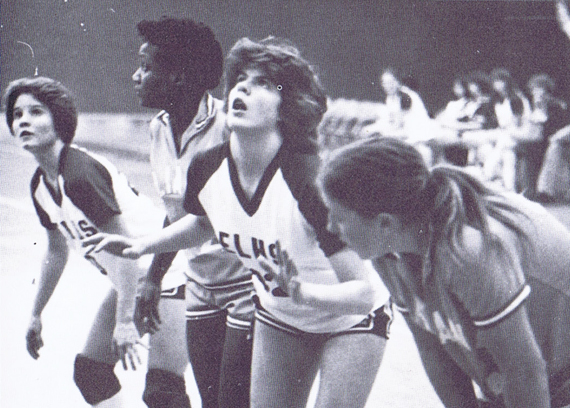
Awaiting the drop of the ball are senior Monica Hoschar and junior Robin Henderson. Monica was chosen to 1st Team All-County while Robin received an Honorable Mention.
ELHS: The girls I have watched play basketball over the last couple of years at the high school were pretty good.
Monica: I practiced, if I did get into a game. I didn't want to mess up against the boys so obviously I tried hard. No one played defense ever in a pickup game. So when I played defense, I stood out that way and I would chase the ball went on down the hill. Those are the three things that allowed me to play.
ELHS: Are you competitive?
Monica: I am. I am competitive. Yeah. ? I think it's just innate.
ELHS: You don't like to lose?
Monica: No I don't and I try to hold back even when I play my kids. I'm like okay I'm going to let them win.
Monica: it's not that I don't like to lose. It's that I can't go medium. How's that, I can't go medium. It's not dang it I lost. It's that I don't have a medium. If I'm going to do something, I go at it as hard as I can physically.
ELHS: When did you actually start to play organized sports?
Monica: Seventh grade. And I was crushed. In seventh grade I went out for. It was the first sport that you could go out for. I was so excited. There were only so many seventh graders that could make the team. I think they had seventh and eighth grade team split and then a ninth grade team. So only a few seventh graders would make it and then primarily the team was 8th graders. I thought for sure in seventh grade I was ready to go. Mrs. Cunningham or Miss Cunningham, not sure which it was, but it was Cunningham, held the tryouts and I showed up on the first day. It was towards the winter, obviously, it was basketball. I was sick. We had tryouts. We were supposed to have them for three days. I was sick second day. I was able to go on the third day but she had picked the team the day before. She had already picked the team. I remember I was crying. I got up the nerve to go and ask her what had happened. I told her I was sick and missed the day before and she told me too bad, I missed it. I was crushed. I remember, I practiced a lot throughout the upcoming year. I was thinking next year, I am not only going to make it, I am going to be the star of the team next year. I wasn't quite Michael Jordan {Laughter) but it had definitely crushed me that I didn't make the team.
Monica: In seventh grade, I had long hair but in eighth grade I got my hair cut. It was really short. Once I went out for the eighth grade team I remember she (the coach) called me up and said what happened, how come you didn't come out last year, I said, "I did." I told her the story and she just said Oh, okay. I wasn't star of the team in eighth grade, but I was pretty good.
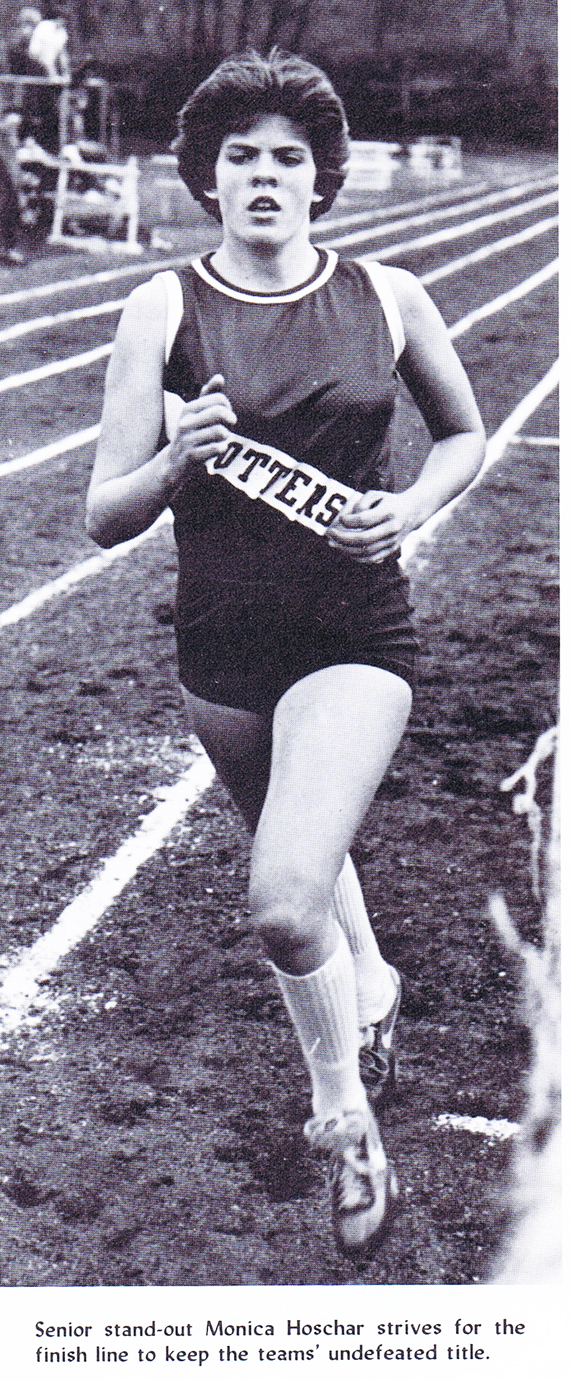
ELHS: Did they have track at that time at Westgate?
Monica: One thing I am thinking about after I read the website, and I knew I was going to be talking to you. The boys on every team, the cross country teams, they were all very nice and very encouraging. There was no animosity whatsoever.
ELHS: There is a noticeable difference in interest in attendance at girl sporting events here when compared to boys.
Monica: It's a different fan base. I'll never forget a neighbor of mine, Bill kittle. He came to the girls basketball game in my junior year. On the bus on the way home one time, he said, "Hey, I was at the game the other night. You guys weren't too bad." It was kind of funny the way he said. He sounded kind of surprised. You can dribble, you can shoot, I just remember him saying that and I felt like saying well, what the heck, what did you think we were?
Monica: You have to pick and choose how much you want to do with your time. Everyone goes to the boys games and is more social. You get to see, be seen, not necessarily to watch the contest.
I think girls and boys play for a different reason. I think girls really don't, I mean they like the accolades and like a crowd. I'm not saying they wouldn't appreciate it if a lot of people came but really, you can't play for that reason. You're probably not going to get that much. A boy, he might get a girlfriend over playing a sport. The girl doesn't play for that. They play for different reasons. They want exercise or like it or just doing the sport itself. Nothing extrinsic, it's more intrinsic. So they don't really count on all the extra accolades as much.
ELHS: That is an interesting thought. I had not thought about that. That'll be a future questions from now on. Why do you play the sport?
Monica: There you go. (Laughter)
ELHS: So why did you play it, each one of them.
Monica: Well, basketball, because I really liked it. I'm a Celtic fan. I just enjoyed the sport itself. I like the team. I really like the team aspect of basketball. When all five people did the thing they were supposed to do. I just liked that.
Monica: In running, running just makes you feel good.
ELHS: Did you ever get a runners high?
Monica: Oh, yeah,. There were a couple of times I wish I had a stopwatch because I know I ran the fastest I had ever ran and I could just go and go and go and it felt good.
ELHS: To get into a zone?
Monica: Yeah, exactly. I wish I could do that in a race but I never could. I wasn't good enough mentally, I was always like a basket case in races.
ELHS: Nervous?
Monica:: Yeah, oh yeah.
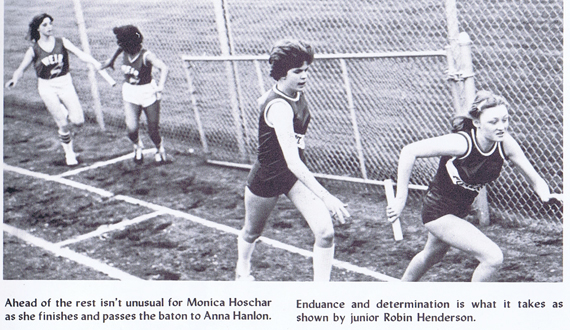
ELHS: Butterflies?
Monica: Yes. I don't think I ever threw up but I was nauseous. I couldn't wait for the race to be over. I hated racing. I loved running but I hated racing. It's kind of different.
ELHS: Did you feel that way before basketball game.
Monica: Not as much because I had a team. It wasn't just all on me. I really like trying to be the leader of the team and trying to get everybody psyched up. Just the commodity of a team.
ELHS: In track, relays, there is a little bit of a team effort there.
Monica: Yeah, a little bit. I think they just started two-mile relay. They didn't have that at the beginning of my track career. Then, towards the end they did. That's where everyone runs the 800. Those runners form a team, that is true.
ELHS: East Liverpool Historical Society Website is not the official East Liverpool High School Potters sports site. Potters Sports Online pretty much fills that role. But we do share links with them and they us. We try to do things a little differently to make it unique and interesting. These interviews for example. A couple years ago we got an e-mail from someone who is very upset because at that time we did not have anything about Wendy Baker on site. We do now, but didn't then.
Monica: She actually lived in my neighborhood little further up the hill. I feel bad because I didn't remember. I was in college. Wendy would've been in middle school or maybe just high school. My dad told me that Wendy and I would sometimes shoot hoops at Westgate. I did not remember that. I felt really bad. He said she would come sometimes, knock on the door and ask if Monica was home. Once I started athletic training. I really didn't come home that much during holidays because I was usually traveling with the team for sports.
Monica: I think Wendy even mentioned in her Hall of Fame induction speech that she and I played some basketball behind Westgate at times. I really felt bad because I didn't remember that.
ELHS: In looking just now I see she graduated in 1989 and you graduated 1981. Your college years would've been from the fall of 1981 to spring 1986 probably. She probably was in junior high or just beginning, high school when you were in college.
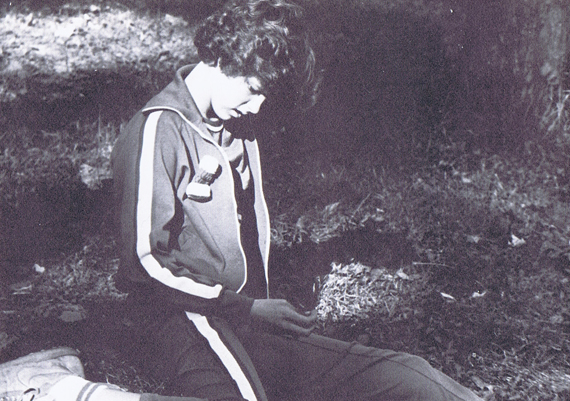
Third year letter winner Monica l-loschar is either concentrating on an upcoming meet or worrying about a big date.
Monica: Okay, yeah that makes sense.
ELHS: You still do sports training?
Monica: I'm still licensed and certified but I haven't done much lately. Every once in a while at Ohio State. I'll cover the team here or there. They have had in the last few years people go on a sabbatical or quit in the middle the year or something like that and I've covered the sport was five or six years for them.
ELHS: As an athletic trainer?
Monica: Yes, as an athletic trainer.
ELHS: Thank you for your time. We appreciate it.
Monica: You're welcome.
SURPRISING TRIVA
Who is the Leading scorer in the history of Ohio high school basketball (both boys and girls)?
Something that Monica asked and volunteered the answer to which we found quite interesting.
Virginia Commonwealth University hires Winthrop's Marlene Stollings as women's basketball coach.
Marlene Stollings had an outstanding prep career at Beaver-Eastern High School in Pike County, Ohio. She finished as the leading scorer in the history of Ohio high school basketball (both boys and girls) with 3,514 points. This point total still remains the highest in Ohio history. The 1993 Ohio Miss Basketball was also presented a resolution by both the Ohio Senate and House of Representatives for her academic and athletic achievement. Stollings was a two-time Division III Player of the Year and four-time conference Player of the Year. She earned Kodak All-American honors her senior season. Her name currently appears over 30 times in the OHSAA (Ohio High School Athletic Association) record books. In her honor, February 19 was declared Marlene Stollings Day in Pike County, Ohio.
http://www.olemisssports.com/sports/w-baskbl/spec-rel/070907aaa.html
This site is the property of the East Liverpool Historical Society.
Regular linking, i.e. providing the URL of the East Liverpool Historical Society web site for viewers to click on and be taken to the East Liverpool Historical Society entry portal or to any specific article on the website is legally permitted.
Hyperlinking, or as it is also called framing, without permission is not permitted.
Legally speaking framing is still in a murky area of the law though there have been court cases in which framing has been seen as violation of copyright law. Many cases that were taken to court ended up settling out-of-court with the one doing the framing agreeing to cease framing and to just use a regular link to the other site.
The East Liverpool Historical Society pays fees to keep their site online. A person framing the Society site is effectively presenting the entire East Liverpool Historical Society web site as his own site and doing it at no cost to himself, i.e. stealing the site.
The East Liverpool Historical Society reserves the right to charge such an individual a fee for the use of the Society’s material.